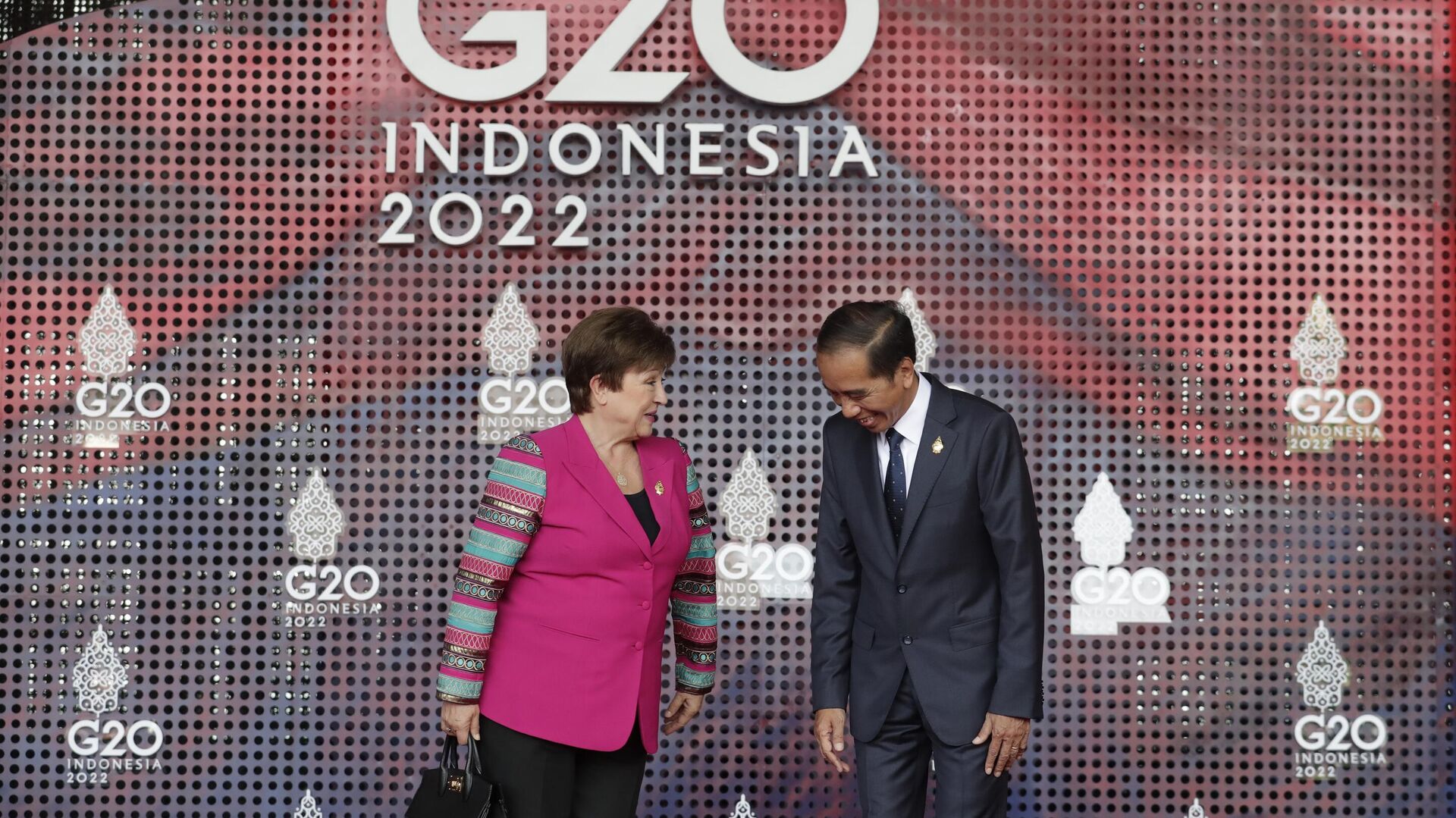https://sputnikglobe.com/20221115/imf-chief-warns-g20-against-dividing-world-into-separate-blocs-1104144700.html
IMF Chief Warns G20 Against Dividing World Into ‘Separate Blocs’
IMF Chief Warns G20 Against Dividing World Into ‘Separate Blocs’
Sputnik International
On Sunday, the International Monetary Fund (IMF) said that the global growth forecast was “gloomier” than what was estimated last month, slipping to 2.7% from... 15.11.2022, Sputnik International
2022-11-15T08:20+0000
2022-11-15T08:20+0000
2022-11-15T08:20+0000
imf
g20 leaders’ summit
energy crisis
food crisis
world
https://cdn1.img.sputnikglobe.com/img/07e6/0b/0f/1104146641_0:164:2899:1794_1920x0_80_0_0_a5f5938da50e792c8ca35be7bcea1653.jpg
Kristalina Georgieva, Managing Director of the International Monetary Fund (IMF), has sounded a warning against the division of world into “separate blocs”, noting that the fragmentation of the global economy could contract the annual global Gross Domestic Product (GDP) by 1.5 to 2 percent.The first session of the summit focused on addressing the challenge of food and energy security in the wake of coordinated efforts by Western states to phase out Russian commodity supplies from the international market in the wake of Moscow’s special military operation in Ukraine.However, the prevailing economic conditions have impacted the developing economies in the short-term, she noted, as many of them were facing high debt levels, depreciating currencies as well as the spillover effects of high interest rates caused by central banks’ attempts to tame retail inflation being experienced in most of the countries.Georgieva further flagged the issue of rising debt levels across developing economies as a major global challenge, noting that 25 per cent of the emerging market economies and 60 per cent of the low-income countries were dealing with high debt levels.The IMF economist also urged the G20 governments to enhance cooperation to address the need for climate financing, particularly with regard to developing climate-resilient agriculture and low-carbon development.
https://sputnikglobe.com/20221013/the-imf-says-the-worst-is-yet-to-come-warns-2023-will-feel-like-a-recession-1101787629.html
Sputnik International
feedback@sputniknews.com
+74956456601
MIA „Rossiya Segodnya“
2022
News
en_EN
Sputnik International
feedback@sputniknews.com
+74956456601
MIA „Rossiya Segodnya“
Sputnik International
feedback@sputniknews.com
+74956456601
MIA „Rossiya Segodnya“
imf, g20 leaders’ summit, energy crisis, food crisis
imf, g20 leaders’ summit, energy crisis, food crisis
IMF Chief Warns G20 Against Dividing World Into ‘Separate Blocs’
On Sunday, the International Monetary Fund (IMF) said that the global growth forecast was “gloomier” than what was estimated last month, slipping to 2.7% from the 2.9% projected previously.
Kristalina Georgieva, Managing Director of the International Monetary Fund (IMF), has sounded a warning against the division of world into “separate blocs”, noting that the fragmentation of the global economy could contract the annual global Gross Domestic Product (GDP) by 1.5 to 2 percent.
Addressing the inaugural session of the G20 Leaders’ Summit in Bali on Tuesday, Georgieva called for “removing barriers”, especially for food and fertilizers, in order to alleviate the sufferings of millions of people in low and middle-income nations.
The first session of the summit focused on addressing the challenge of food and energy security in the wake of coordinated efforts by Western states to
phase out Russian commodity supplies from the international market in the wake of Moscow’s special military operation in Ukraine.
Georgieva underlined that advanced and middle-income economies, which have experienced the benefits of free trade, were now at a greater risk of economic contraction, compared to other nations.
However, the prevailing economic conditions have impacted the developing economies in the short-term, she noted, as many of them were facing high debt levels, depreciating currencies as well as the spillover effects of high interest rates caused by central banks’ attempts to tame retail inflation being experienced in most of the countries.

13 October 2022, 00:03 GMT
Georgieva further flagged the issue of rising debt levels across developing economies as a major global challenge, noting that 25 per cent of the emerging market economies and 60 per cent of the low-income countries were dealing with high debt levels.
The IMF economist also urged the G20 governments to enhance cooperation to address the need for climate financing, particularly with regard to developing climate-resilient agriculture and low-carbon development.



